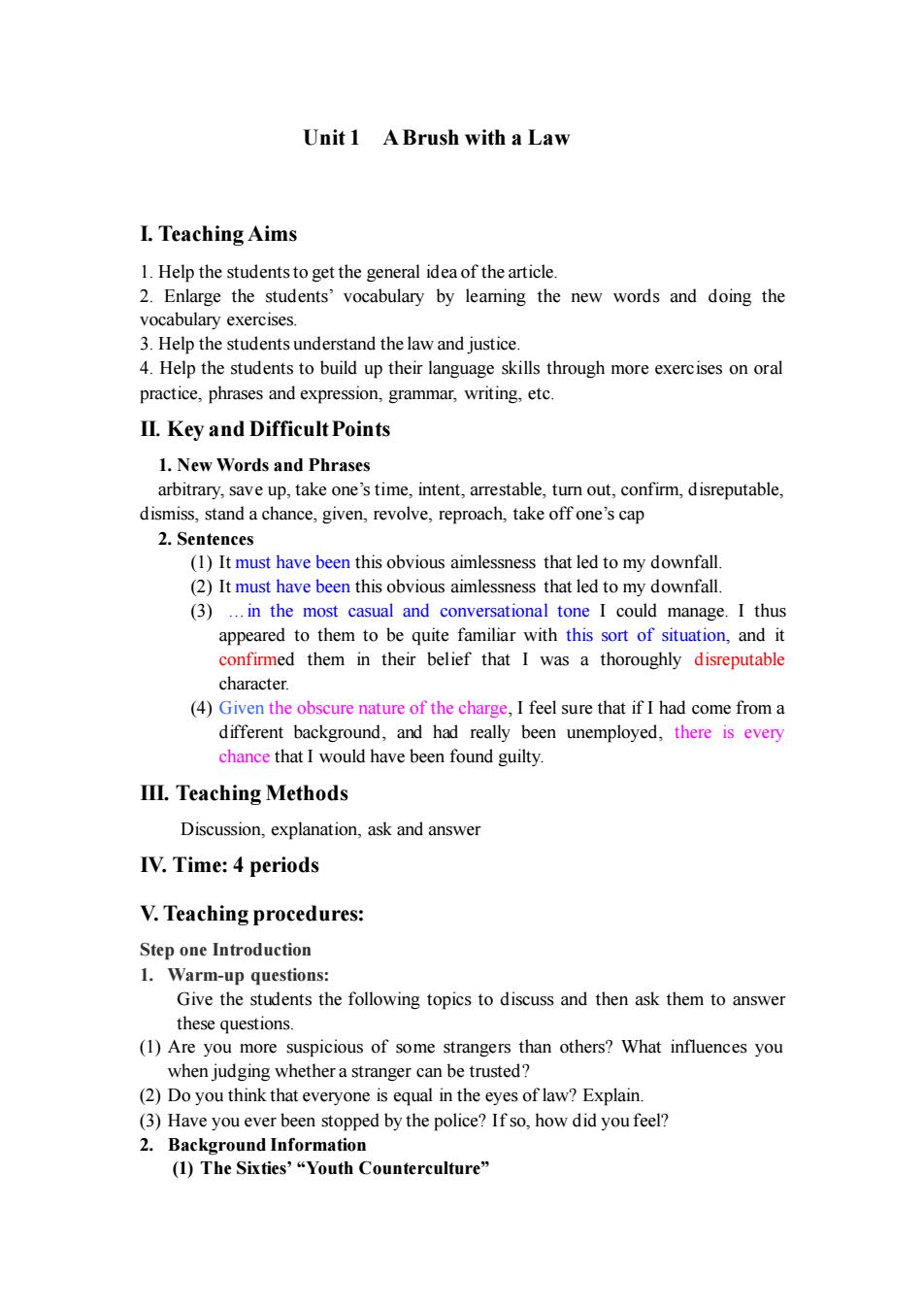
Unit 1 A Brush with a Law I.Teaching Aims 1.Help the studentsto get the general ideaof the article. 2.Earge by leaming the newwords and doing the vocabulary exercises. 3.Help the students understand the law and justice. 4.Help the students to build up their language skills through more exercises on oral practice.phrases and expression,grammar,writing.etc. II.Key and Difficult Points 1.New Words and Phrases arbitrary,save up,take one's time,intent,arrestable,turn out,confirm,disreputable, dismiss,stand a chance,given,revolve,reproach,take off one's cap av etesthateow (2)It must have been this obvious aimlessness that led to my downfall. (3)...in the most casual and conversational tone I could manage.I thus appeared to them to be quite familiar with this sort of situation,and it nfirmed them in their belief that I was a thoroughly disreputable (4)Given the obscure nature of the charge,I feel sure that if I had come froma different background,and had really been unemployed,there is every chance that I would have been found guilty. III.Teaching Methods Discussion,explanation,ask and answer IV.Time:4 periods V.Teaching procedures: Step one Introduction 1.Warm-up questions: Give the students the following topics to discuss and then ask them to answer these questions (1)Are you more suspicious of some strangers than others?What influences you when judgi whether a stranger c can be (3)Have you ever been stopped by the police?If so,how did you feel? 2.Background Information (I)The Sixties'“Youth Counterculture
Unit 1 A Brush with a Law I. Teaching Aims 1. Help the students to get the general idea of the article. 2. Enlarge the students’ vocabulary by learning the new words and doing the vocabulary exercises. 3. Help the students understand the law and justice. 4. Help the students to build up their language skills through more exercises on oral practice, phrases and expression, grammar, writing, etc. II. Key and Difficult Points 1. New Words and Phrases arbitrary, save up, take one’s time, intent, arrestable, turn out, confirm, disreputable, dismiss, stand a chance, given, revolve, reproach, take off one’s cap 2. Sentences (1) It must have been this obvious aimlessness that led to my downfall. (2) It must have been this obvious aimlessness that led to my downfall. (3) …in the most casual and conversational tone I could manage. I thus appeared to them to be quite familiar with this sort of situation, and it confirmed them in their belief that I was a thoroughly disreputable character. (4) Given the obscure nature of the charge, I feel sure that if I had come from a different background, and had really been unemployed, there is every chance that I would have been found guilty. III. Teaching Methods Discussion, explanation, ask and answer IV. Time: 4 periods V. Teaching procedures: Step one Introduction 1. Warm-up questions: Give the students the following topics to discuss and then ask them to answer these questions. (1) Are you more suspicious of some strangers than others? What influences you when judging whether a stranger can be trusted? (2) Do you think that everyone is equal in the eyes of law? Explain. (3) Have you ever been stopped by the police? If so, how did you feel? 2. Background Information (1) The Sixties’ “Youth Counterculture

The word "counterculture"was coined in the 1960s for the attitudes and life styles of many young people who rejected conventional socia values and demanded more personal freedom.The counterculture first arose in the U.S.during the 1960s and soon spread to Britain,France and other western countries.These young people were opposed to the Vietnam War and dissatisfied with the existing state of affairs in their society.Yet.unable to find a more constructive way of struggling against these. they indulgedt emselves ockmusic and too great pride in wearing long hair and unusual clothes and in taking up anything that was unconventional.The counterculture declined in the late 1970s. (2)London London is the capital of the United Kingdom.It is situated in southeastern England along the Thames River.With a population of about 7 million,this vas metropolis is by fa argest city in Europe,a distinction it has maintained since th 17th century.In the 19th century it was the largest and most influential city in the world,the center of a large and prosperous overseas empire.Today although it no longer ranks among the world's most populous cities,London is still one of the worlds major financial and cultural centers (3)Lawyer Solicit -Barrister Lawyer:the general term for anyone whose work is to advise his clients about the law and represent them in court. Solicitor:a lawyer who gives advice,appears in lower courts,and prepares cases for a barrister to argue in a higher court. Barrister:a lawyer has the right of speaking and arguing in the higher courts of law 3.Introductory Remarks We all know that the chief purposes of law are to maintain peace and order,to protect the rights of citizens,to secure justice and to punish wrong-doers,those who break the law.Good laws are those that are considered serve the ause of justice for the society to which they apply.But even good d laws may be unjustly be unjust in certain situations.In the story we're going to study today,the author tells us about what happened to him more than a decade ago.It was really a very unpleasant experience,yet it provides us with much food for thought. Step Two Global reading ents 10 utes to read the text as quickly as they can,and ask them to think about these questions in the process of reading. 1.True or False Ouestions: (1)The story took place one February in the 1960s in Britain. The narrator was a 19-vear-old college student at the time. (3)Hev vas looking for a job so that he emoney to pay for his tuition (4)He was arrested by a policeman while he was stealing milk bottles from doorsteps. (5)The policemen let him go after he gave a clear explanation. (6)The narrator defended himself so successfully in court that the magistrates found
The word “counterculture” was coined in the 1960s for the attitudes and life styles of many young people who rejected conventional social values and demanded more personal freedom. The counterculture first arose in the U.S. during the 1960s and soon spread to Britain, France and other western countries. These young people were opposed to the Vietnam War and dissatisfied with the existing state of affairs in their society. Yet, unable to find a more constructive way of struggling against these, they indulged themselves in sex, drugs, alcohol and rock music and took great pride in wearing long hair and unusual clothes and in taking up anything that was unconventional. The counterculture declined in the late 1970s. (2)London London is the capital of the United Kingdom. It is situated in southeastern England along the Thames River. With a population of about 7 million, this vast metropolis is by far the largest city in Europe, a distinction it has maintained since the 17th century. In the 19th century it was the largest and most influential city in the world, the center of a large and prosperous overseas empire. Today although it no longer ranks among the world’s most populous cities, London is still one of the world’s major financial and cultural centers. (3) Lawyer—Solicitor—Barrister Lawyer: the general term for anyone whose work is to advise his clients about the law and represent them in court. Solicitor: a lawyer who gives advice, appears in lower courts, and prepares cases for a barrister to argue in a higher court. Barrister: a lawyer who has the right of speaking and arguing in the higher courts of law. 3. Introductory Remarks We all know that the chief purposes of law are to maintain peace and order, to protect the rights of citizens, to secure justice and to punish wrong-doers, those who break the law. Good laws are those that are considered to serve the cause of justice for the society to which they apply. But even good laws may be unjustly applied or may be unjust in certain situations. In the story we’re going to study today, the author tells us about what happened to him more than a decade ago. It was really a very unpleasant experience, yet it provides us with much food for thought. Step Two Global reading Give the students 10 minutes to read the text as quickly as they can, and ask them to think about these questions in the process of reading. 1. True or False Questions: (1) The story took place one February in the 1960s in Britain. (2) The narrator was a 19-year-old college student at the time. (3) He was looking for a job so that he could make some money to pay for his tuition. (4) He was arrested by a policeman while he was stealing milk bottles from doorsteps. (5) The policemen let him go after he gave a clear explanation. (6) The narrator defended himself so successfully in court that the magistrates found
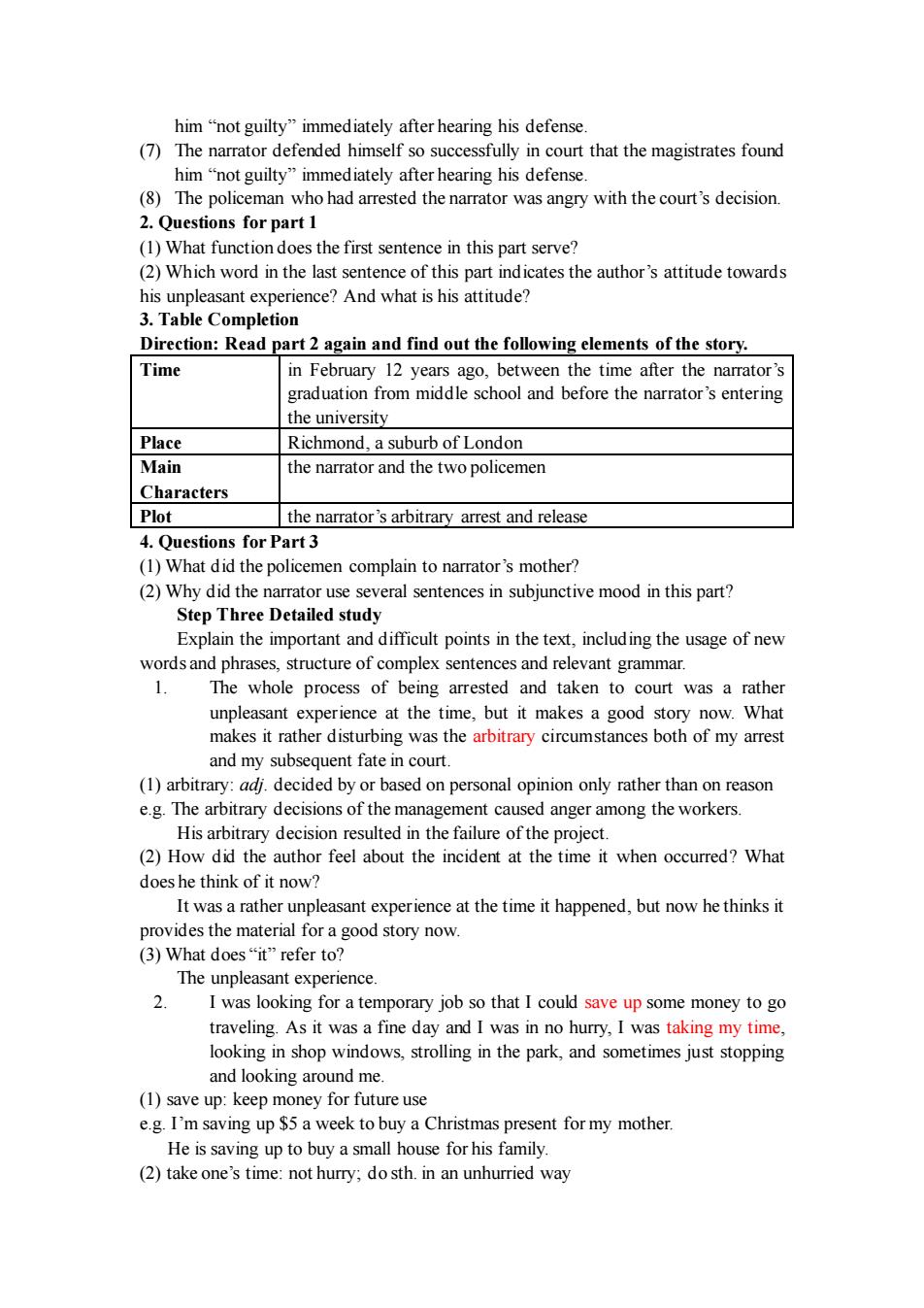
him"not guilty"immediately after hearing his defense (The arrato defended him successfully in cour that the magistrates found him"not guilty"immediately afterhearing his defense (8)The policeman who had arrested the narrator was angry with the court's decision. 2.Ouestions for part 1 (1)What function does the first sentence in this part serve? (2)Which word in the last sentence of this s pa indicates the author's attitude towards unpleasant experience?And what is his attitude? Direction:Read part 2 again and find out the following elements of the story. Time in February 12 years ago,between the time after the narrator's raduation from middle school and before the narrator's entering the university Place Richmond,a suburb of London Main the narrator and the two policemen Characters Plot the narrator's arbitrary arrest and release 4.Questions for Part 3 (1)What did the policemen complain to narrator's mother? (2)Why did the narrator use several sentences in subjunctive mood in this part? Step Three Detailed study the important and diffcult points in the text,including the usage of new words and phrases structure of complex sentences and relevant grammar The whole process of being arrested and taken to court was a rather unpleasant experience at the time,but it makes a good story now.What makes it rather disturbing was the arbitrary circumstances both of my arrest and my ent fate i (1)arbitrary:decided by or based on personal opinion only rather than on reason e.g.The arbitrary decisions of the management caused anger among the workers. His arbitrary decision resulted in the failure of the project. (2)How did the author feel about the incident at the time it when occurred?What does he think of it now? It was a rather unpleasant experience at the time it happened,but now he thinks it provides the material for a good story now. (3)What does“it”refer to? The unpleasant experience. 2 I was looking for a temporary job so that I could save up some money to go traveling.Asit was a fine day and I was in no hury.I was taking my time looking in shop windows,strolling in the park,and sometimes just stopping and looking around me. (1)save up:keep money for future use e.g i'm saving up $5 a week to buy a christmas present formy mother He is sav mily (2)take one's time:not hurry:do sth.in an unhurried way
him “not guilty” immediately after hearing his defense. (7) The narrator defended himself so successfully in court that the magistrates found him “not guilty” immediately after hearing his defense. (8) The policeman who had arrested the narrator was angry with the court’s decision. 2. Questions for part 1 (1) What function does the first sentence in this part serve? (2) Which word in the last sentence of this part indicates the author’s attitude towards his unpleasant experience? And what is his attitude? 3. Table Completion Direction: Read part 2 again and find out the following elements of the story. Time in February 12 years ago, between the time after the narrator’s graduation from middle school and before the narrator’s entering the university Place Richmond, a suburb of London Main Characters the narrator and the two policemen Plot the narrator’s arbitrary arrest and release 4. Questions for Part 3 (1) What did the policemen complain to narrator’s mother? (2) Why did the narrator use several sentences in subjunctive mood in this part? Step Three Detailed study Explain the important and difficult points in the text, including the usage of new words and phrases, structure of complex sentences and relevant grammar. 1. The whole process of being arrested and taken to court was a rather unpleasant experience at the time, but it makes a good story now. What makes it rather disturbing was the arbitrary circumstances both of my arrest and my subsequent fate in court. (1) arbitrary: adj. decided by or based on personal opinion only rather than on reason e.g. The arbitrary decisions of the management caused anger among the workers. His arbitrary decision resulted in the failure of the project. (2) How did the author feel about the incident at the time it when occurred? What does he think of it now? It was a rather unpleasant experience at the time it happened, but now he thinks it provides the material for a good story now. (3) What does “it” refer to? The unpleasant experience. 2. I was looking for a temporary job so that I could save up some money to go traveling. As it was a fine day and I was in no hurry, I was taking my time, looking in shop windows, strolling in the park, and sometimes just stopping and looking around me. (1) save up: keep money for future use e.g. I’m saving up $5 a week to buy a Christmas present for my mother. He is saving up to buy a small house for his family. (2) take one’s time: not hurry; do sth. in an unhurried way
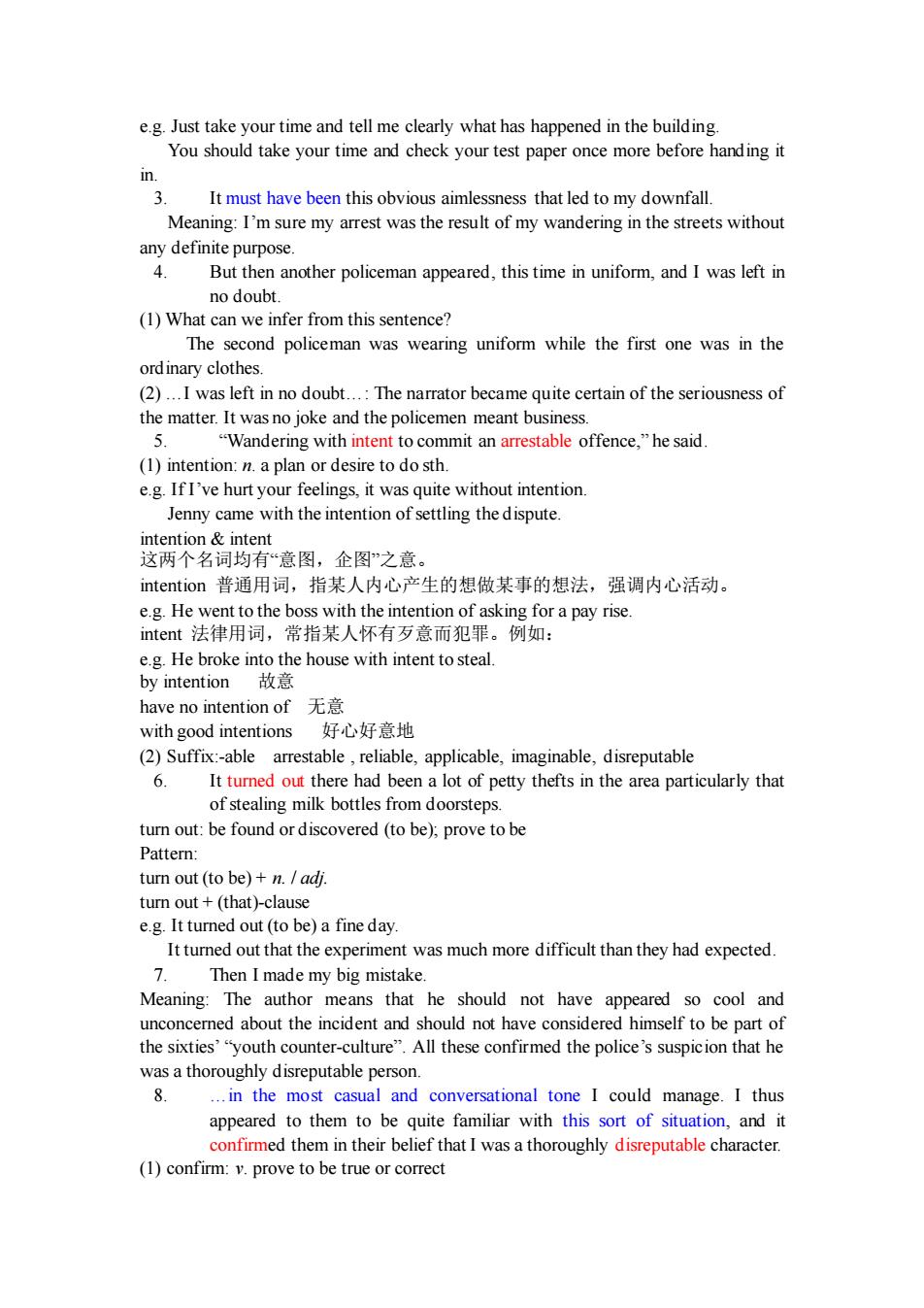
e.g.Just take your time and tell me clearly what has happened in the building You should take your time and check your test paper once more before harding i 3 It must have been this obvious aimlessness that led to my downfall. Meaning:I'm sure my arrest was the result of my wandering in the streets without any purp. 4 But then another policeman appeared,this time in uniform,and I was left ir no doubt (1)What can we infer from this sentence? The second policeman was wearing uniform while the first one was in the ordinary clothes (2)...I was left in no doubt The narrator became quite certain of the seriousness of the matter.It wasno joke and the policemen meant business Wandering with intent to commit an arrestable offence,"he said (1)intention:n.a plan or desire to dosth. e.g.IfI've hurt your feelings,it was quite without intention. Jenny came with the intention of settling the dispute. “音.企图之音 intention普通用词,指某人内心产生的想做某事的想法,强调内心活动。 e.g.He went to the boss with the intention of asking for a pay rise. intent法律用词,常指某人怀有歹意而犯罪。例如: He broke into the house with intent to steal. have no intention of 无意 with good intentions 好心好意地 (2)Suffix:-able arrestable,reliable,applicable,imaginable,disreputable 6 It tumed ou there had been a lot of petty thefts in the area particularly that of stealing milk bottles doorsteps tur out:be found or discovered (to be);prove to be Pattern: turn out (to be)+n./adi. turn out+(that)-clause eg.It tumed out(to be)a fine day It tumed out that the experiment was much more difficult than they had expected Then I made my big mistake Meaning:The author means that he should not have appeared so cool and unconcemed about the incident and should not have considered himself to be part of the sixties'"youth co unte culture”All thes onfirmed the police cion that he sa thoroughly disreputable perso 8. .in the most casual and conversational tone I could manage.I thus appeared to them to be quite familiar with this sort of situation,and it confirmed them in their belief that I was a thoroughly disreputable character. (1)confirm:v.prove to be true or correct
e.g. Just take your time and tell me clearly what has happened in the building. You should take your time and check your test paper once more before handing it in. 3. It must have been this obvious aimlessness that led to my downfall. Meaning: I’m sure my arrest was the result of my wandering in the streets without any definite purpose. 4. But then another policeman appeared, this time in uniform, and I was left in no doubt. (1) What can we infer from this sentence? The second policeman was wearing uniform while the first one was in the ordinary clothes. (2) …I was left in no doubt…: The narrator became quite certain of the seriousness of the matter. It was no joke and the policemen meant business. 5. “Wandering with intent to commit an arrestable offence,” he said. (1) intention: n. a plan or desire to do sth. e.g. If I’ve hurt your feelings, it was quite without intention. Jenny came with the intention of settling the dispute. intention & intent 这两个名词均有“意图,企图”之意。 intention 普通用词,指某人内心产生的想做某事的想法,强调内心活动。 e.g. He went to the boss with the intention of asking for a pay rise. intent 法律用词,常指某人怀有歹意而犯罪。例如: e.g. He broke into the house with intent to steal. by intention 故意 have no intention of 无意 with good intentions 好心好意地 (2) Suffix:-able arrestable , reliable, applicable, imaginable, disreputable 6. It turned out there had been a lot of petty thefts in the area particularly that of stealing milk bottles from doorsteps. turn out: be found or discovered (to be); prove to be Pattern: turn out (to be) + n. / adj. turn out + (that)-clause e.g. It turned out (to be) a fine day. It turned out that the experiment was much more difficult than they had expected. 7. Then I made my big mistake. Meaning: The author means that he should not have appeared so cool and unconcerned about the incident and should not have considered himself to be part of the sixties’ “youth counter-culture”. All these confirmed the police’s suspicion that he was a thoroughly disreputable person. 8. …in the most casual and conversational tone I could manage. I thus appeared to them to be quite familiar with this sort of situation, and it confirmed them in their belief that I was a thoroughly disreputable character. (1) confirm: v. prove to be true or correct
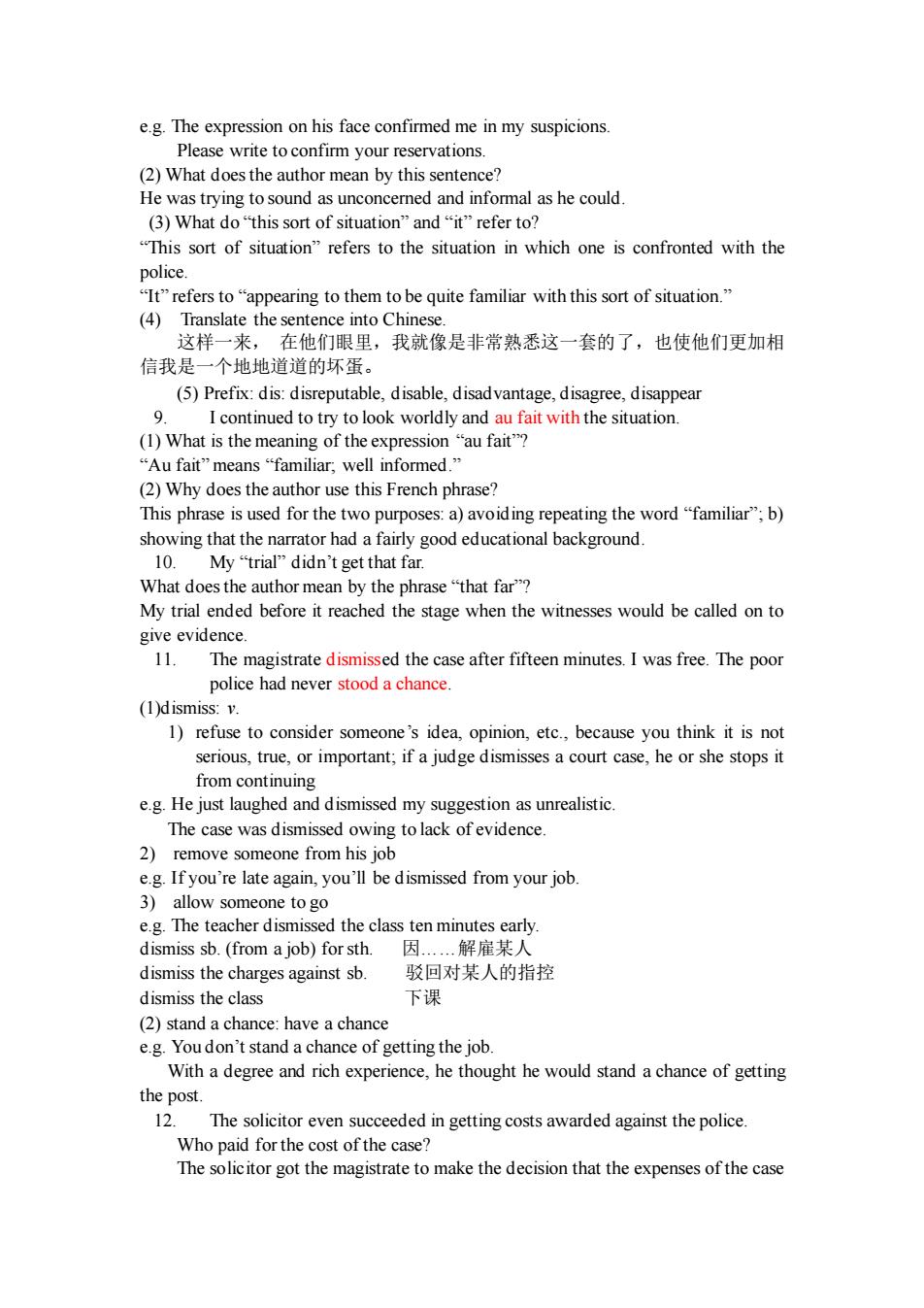
e.g.The expression on his face confirmed me in my suspicions Pleas onfirm yo (2)What does the author mean by this sentence? He was trying to sound as unconcerned and informal as he could. (3)What do"this sort of situation”and“it”refer to? "This sort of situation"refers to the situation in which one is confronted with the nolice (4)Translate the sentence into Chine 这样一米, 在他们眼里,我就像是非常熟悉这一套的了,也使他们更加相 信我是一个地地道道的坏蛋。 0 fait with the situation. (1)What is the meaning of the expressior afat “Au fait'”means“familiar,well informed. (2)Why does the author use this French phrase? This phrase is used for the two purposes:a)avoiding repeating the word"familiar"b) showing that tor had a good educational background 01 My didn'tget that fa What does the author mean by the phrase"that far"? My trial ended before it reached the stage when the witnesses would be called on to give evidence. 11 The magistrate dismissed the case after fifteen minutes.I was free.The poor police had never stood a chance (1)dismiss:v. 1)refuse to consider someone's idea,opinion,etc.,because you think it is not serious,true,or important:if a judge dismisses a court case,he or she stops it from continuing e.g.He jus lau hed a nd dismissed my uggestion as unrealistic. The case was dismissed owing to lack of evidence. 2)remove someone from his job e.g.If you're late again,you'll be dismissed from your job. 3)allow someone to go e g The teacher dismissed the class ten minutes early dismiss sb.(from a job)forsth. 因 解雇某人 dismiss the charges against sb 驳回对某人的指控 dismiss the class 下果 (2)stand a chance:have a chance e.g.Youdon't stand a chance of getting the job With a degree e and rich experience,he thought he would stand a chance of getting the post 12. The solicitor even succeeded in getting costs awarded against the police. Who paid for the cost of the case? The solicitor got the magistrate to make the decision that the expenses of the case
e.g. The expression on his face confirmed me in my suspicions. Please write to confirm your reservations. (2) What does the author mean by this sentence? He was trying to sound as unconcerned and informal as he could. (3) What do “this sort of situation” and “it” refer to? “This sort of situation” refers to the situation in which one is confronted with the police. “It” refers to “appearing to them to be quite familiar with this sort of situation.” (4) Translate the sentence into Chinese. 这样一来, 在他们眼里,我就像是非常熟悉这一套的了,也使他们更加相 信我是一个地地道道的坏蛋。 (5) Prefix: dis: disreputable, disable, disadvantage, disagree, disappear 9. I continued to try to look worldly and au fait with the situation. (1) What is the meaning of the expression “au fait”? “Au fait” means “familiar; well informed.” (2) Why does the author use this French phrase? This phrase is used for the two purposes: a) avoiding repeating the word “familiar”; b) showing that the narrator had a fairly good educational background. 10. My “trial” didn’t get that far. What does the author mean by the phrase “that far”? My trial ended before it reached the stage when the witnesses would be called on to give evidence. 11. The magistrate dismissed the case after fifteen minutes. I was free. The poor police had never stood a chance. (1)dismiss: v. 1) refuse to consider someone’s idea, opinion, etc., because you think it is not serious, true, or important; if a judge dismisses a court case, he or she stops it from continuing e.g. He just laughed and dismissed my suggestion as unrealistic. The case was dismissed owing to lack of evidence. 2) remove someone from his job e.g. If you’re late again, you’ll be dismissed from your job. 3) allow someone to go e.g. The teacher dismissed the class ten minutes early. dismiss sb. (from a job) for sth. 因……解雇某人 dismiss the charges against sb. 驳回对某人的指控 dismiss the class 下课 (2) stand a chance: have a chance e.g. You don’t stand a chance of getting the job. With a degree and rich experience, he thought he would stand a chance of getting the post. 12. The solicitor even succeeded in getting costs awarded against the police. Who paid for the cost of the case? The solicitor got the magistrate to make the decision that the expenses of the case
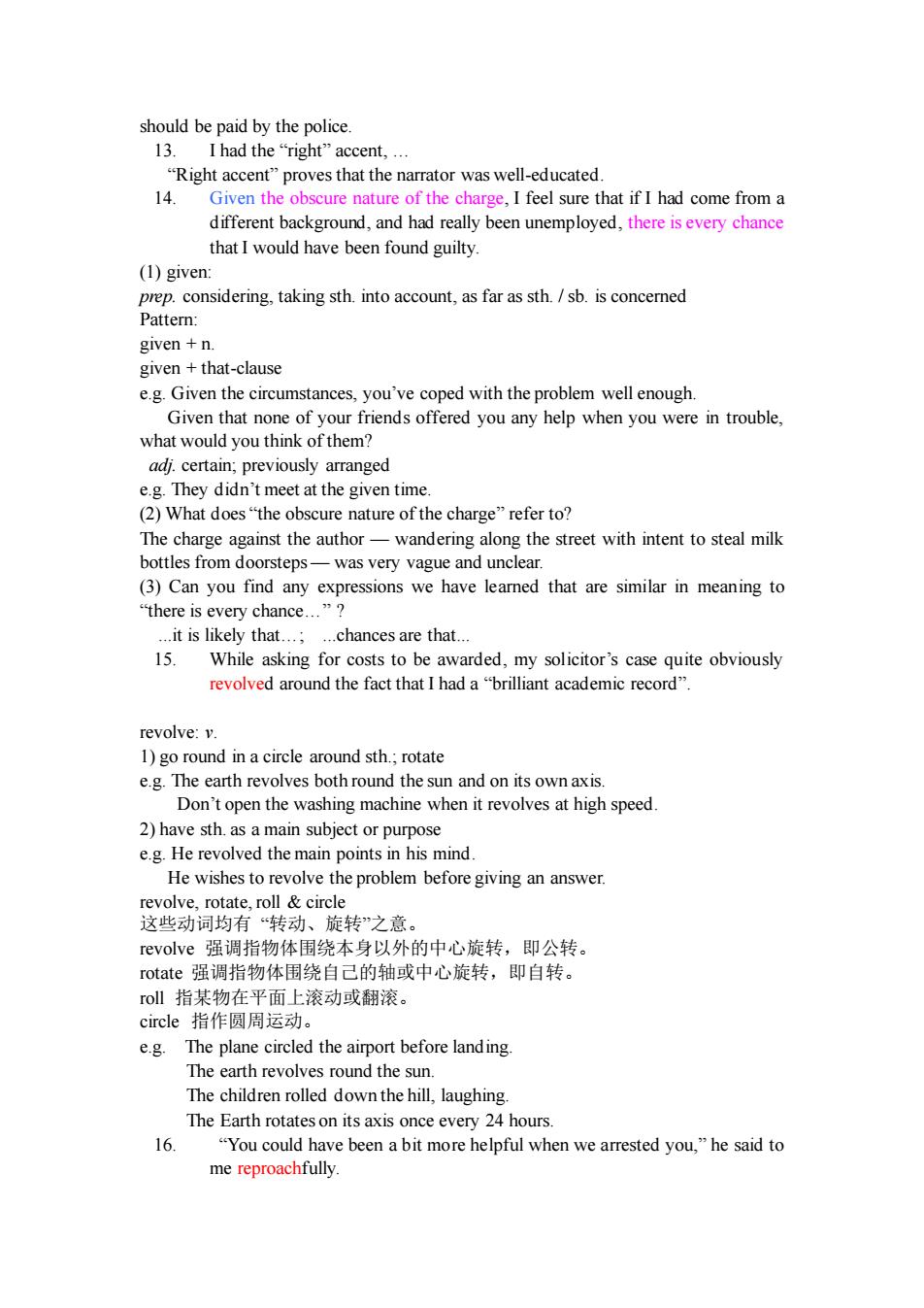
should be paid by the police 13 I had the"right"accen Right accent"proves that the narrator was well-educated. 14. Given the obscure nature of the charge.I feel sure that if I had come from a different background,and had really been unemployed,there is every chance that I would have been found guilty. (1)given prep.considering,taking sth.into account,as far as sth./sb.is concemed Pattern: given n. given that-clause Given the with the poblem wellenou Given that n ne of your friends offered you any help when you were in trouble what would you think of them? adi.certain:previously arranged e.g.They didn't meet at the given time. (2)What does"the obscure nature of the charge"refer to? The charge against the author wandering along the street with intent to steal milk bottles from doorsteps- was very vague and unclea (3)Can you find any expressions we have learned that are similar in meaning to "there is every chance.."? it is likely that: chances are that While asking for ts to be awarded. my solicitor's case quite obviously revolved around the fact that I had academic record revolve:y 1)go round in a circle around sth.:rotate n axis 2)have sth.as a main subject or purpose e.g.He revolved the main points in his mind He wishes to revolve the problem before giving an answer. revolve,rotate,roll&circle 这些动词均有“转动、旋转”之意 revolve强调指物体围绕本身以外的中心旋转,即公转。 rotate强调指物体围绕自己的轴或中心旋转,即自转。 ro指某物在平面上滚动或翻滚。 cirele指作圆周运动。 e.g.The plane circled the airport before landing The earth revolv s round the sur The children rolled down the hill,laughing. The Earth rotates on its axis once every 24 hours. 16. "You could have been a bit more helpful when we arrested you."he said to me reproachfully
should be paid by the police. 13. I had the “right” accent, … “Right accent” proves that the narrator was well-educated. 14. Given the obscure nature of the charge, I feel sure that if I had come from a different background, and had really been unemployed, there is every chance that I would have been found guilty. (1) given: prep. considering, taking sth. into account, as far as sth. / sb. is concerned Pattern: given + n. given + that-clause e.g. Given the circumstances, you’ve coped with the problem well enough. Given that none of your friends offered you any help when you were in trouble, what would you think of them? adj. certain; previously arranged e.g. They didn’t meet at the given time. (2) What does “the obscure nature of the charge” refer to? The charge against the author — wandering along the street with intent to steal milk bottles from doorsteps — was very vague and unclear. (3) Can you find any expressions we have learned that are similar in meaning to “there is every chance…” ? ...it is likely that…; ...chances are that... 15. While asking for costs to be awarded, my solicitor’s case quite obviously revolved around the fact that I had a “brilliant academic record”. revolve: v. 1) go round in a circle around sth.; rotate e.g. The earth revolves both round the sun and on its own axis. Don’t open the washing machine when it revolves at high speed. 2) have sth. as a main subject or purpose e.g. He revolved the main points in his mind. He wishes to revolve the problem before giving an answer. revolve, rotate, roll & circle 这些动词均有 “转动、旋转”之意。 revolve 强调指物体围绕本身以外的中心旋转,即公转。 rotate 强调指物体围绕自己的轴或中心旋转,即自转。 roll 指某物在平面上滚动或翻滚。 circle 指作圆周运动。 e.g. The plane circled the airport before landing. The earth revolves round the sun. The children rolled down the hill, laughing. The Earth rotates on its axis once every 24 hours. 16. “You could have been a bit more helpful when we arrested you,” he said to me reproachfully

(1)reproach:v.to blame or criticize sb for sth. e.g.He e reproached hin mself for not telling her truth e was reproac ched by her boss (2)What does"a bit more helpful"mean? "A bit more helpful"means that the narrator should have argued with or turned against the policeman when he was arrested. Beca use the polic the ca and had to pay for it 17 Then they,presumably,would have apologized,perhaps even taken off their caps.and let me on my way (1)taken offone's cap(hat)to sb.:to show respect or admiration for(sb.). (2)What can you infer from the phrase? The autho felt that the policemen blamed him for not being cooperative whe n they arrested him IV.Summary 1.Main idea of the text ■The autho eof being arrested and taken to court years ag men ar they found hime(留一头蓬乱的长发并在街上漫无目 and they thought he might(有偷窃奶瓶的企图) from doorsteps.Finally he was released from the charge because of his“right'”accent,(体面的中产阶级的双亲) 可靠的证人) and his very good solicitor But the author feels sure that(如果他出身在另一种背 景的家庭里,并且真的是失业了)】 the magistrate would most probably(判他有罪) From this case the author thinks that the law may be unjustly applied or may 6e unjust in sometimes 2.Structure Para.1.The narrator has once been in trouble with the law,which was a rather unpleasant experience Para.2-20 The narrator was arbitrarily arrested and released. Para.21-22 The police complained that the author should have been outraged and talked about his real identity. 3.Words and expressions V.Homework 1.Memorize the new words and phrases in the text. 2.Do exercises on p7-17 3.Learn the text in"Reading Activity"by yourself. 4.Write a composition about 120 words describing a story in which you were
(1) reproach: v. to blame or criticize sb for sth. e.g. He reproached himself for not telling her truth. She was reproached by her boss. (2) What does “a bit more helpful” mean? “A bit more helpful” means that the narrator should have argued with or turned against the policeman when he was arrested. (3) Why did the policeman say it reproachfully? Because the police had failed in the case and had to pay for it. 17. Then they, presumably, would have apologized, perhaps even taken off their caps, and let me on my way. (1) taken off one’s cap (hat) to sb.: to show respect or admiration for (sb.). (2) What can you infer from the phrase? The author felt ridiculous that the policemen blamed him for not being cooperative when they arrested him. IV. Summary 1. Main idea of the text ◼ The author narrates his unpleasant experience of being arrested and taken to court twelve years ago. The policemen arrested him simply because they found him( 留一头蓬乱的长发并在街上漫无目的地漫游 ) _______________________ and they thought he might (有偷窃奶瓶的企图) _______________________ from doorsteps. Finally he was released from the charge because of his “right” accent, ( 体面 的 中产 阶级 的双 亲 ) ___________________________ , (可靠的证人)____________________and his very good solicitor. But the author feels sure that (如果他出身在另一种背 景的家庭里,并且真的是失业了)_____________________________ , the magistrate would most probably(判他有罪)_________________________. From this case the author thinks that the law may be unjustly applied or may be unjust in certain situation sometimes. 2. Structure Para. 1. The narrator has once been in trouble with the law, which was a rather unpleasant experience. Para. 2-20 The narrator was arbitrarily arrested and released. Para. 21-22 The police complained that the author should have been outraged and talked about his real identity. 3. Words and expressions V. Homework 1. Memorize the new words and phrases in the text. 2. Do exercises on p7-17 3. Learn the text in “Reading Activity” by yourself. 4. Write a composition about 120 words describing a story in which you were
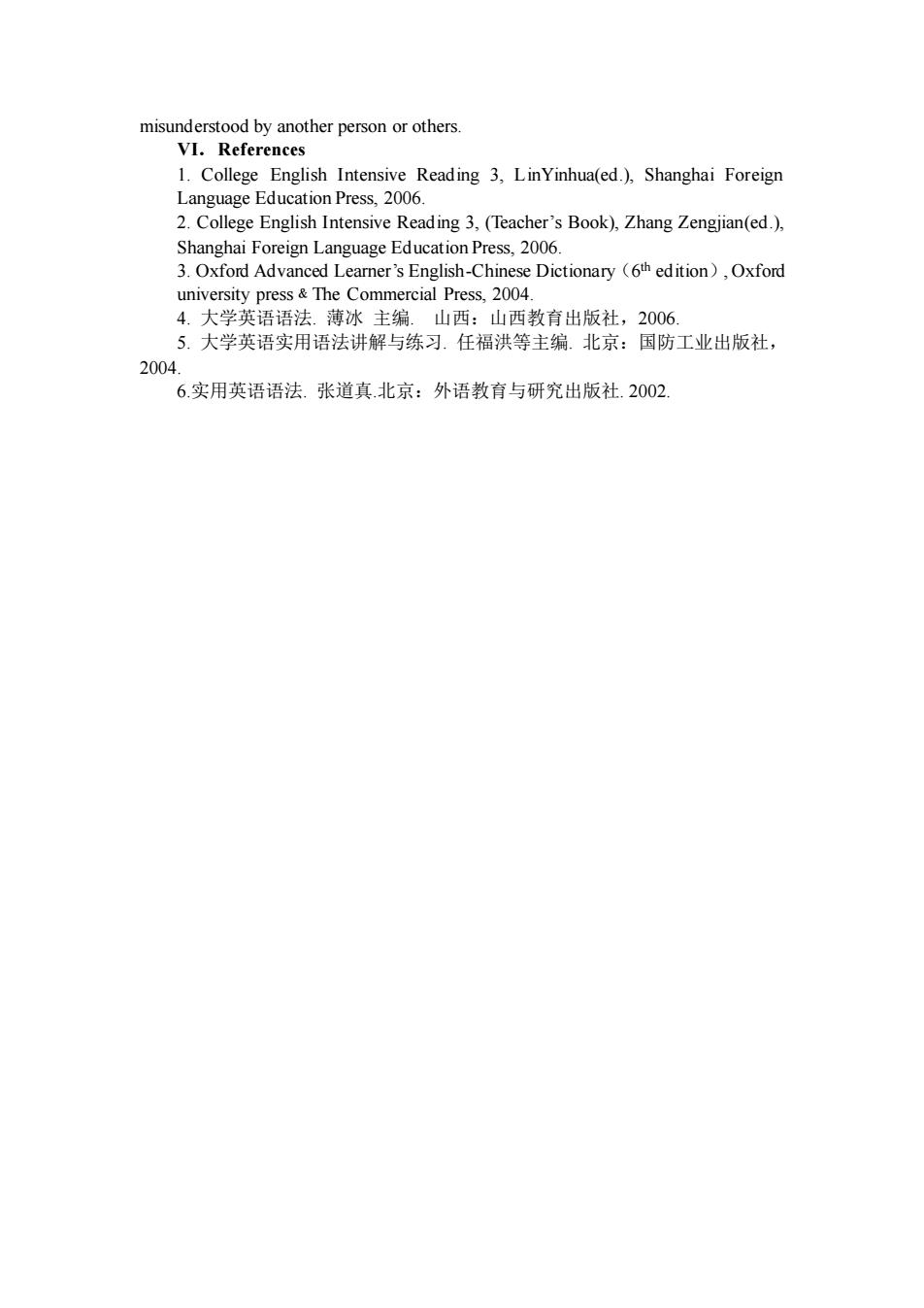
misunderstood by another person orothers VI.References 1.College English Intensive Reading 3.LinYinhua(ed.).Shanghai Foreign Language Education Press,2006. 2.College English Intensive Reading 3,(Teacher's Book),Zhang Zengjian(ed.), Shanghai Foreign Language Education Press,2006. er's English-Chinese Dictionary (6hedition),Oxford university pres The C ercial P 大学英语语法.薄冰主编.山西:山西教育出版社,2006 5.大学英语实用语法讲解与练习.任福洪等主编。北京:国防工业出版社, 200 6.实用英语语法.张道真.北京:外语教育与研究出版社.2002
misunderstood by another person or others. VI.References 1. College English Intensive Reading 3, LinYinhua(ed.), Shanghai Foreign Language Education Press, 2006. 2. College English Intensive Reading 3, (Teacher’s Book), Zhang Zengjian(ed.), Shanghai Foreign Language Education Press, 2006. 3. Oxford Advanced Learner’s English-Chinese Dictionary(6 th edition), Oxford university press﹠The Commercial Press, 2004. 4. 大学英语语法. 薄冰 主编. 山西:山西教育出版社,2006. 5. 大学英语实用语法讲解与练习. 任福洪等主编. 北京:国防工业出版社, 2004. 6.实用英语语法. 张道真.北京:外语教育与研究出版社. 2002